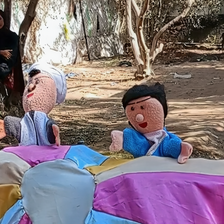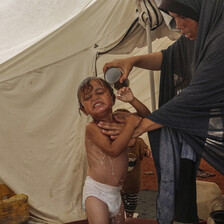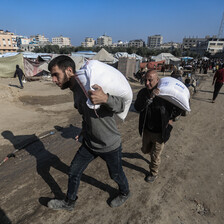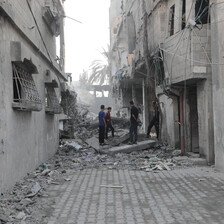The Electronic Intifada 15 October 2024

The author’s children playing with the new additions to the family.
I woke up terrified one night to the sound of an Israeli bombing near the shelter where I now live, west of Deir al-Balah in the central Gaza Strip.
That night, like so many others, my five children cried out in fear. Other children in the camp did so, too.
Their mothers and I were soon busy calming the children down. We did not know what exactly had been bombed.
I started telling my children the story of Cinderella to eventually get them back to sleep until we were surprised by a visitor popping her head inside of our tent.
It was a cat, seemingly as terrified as my children: Saeda, 12, featured in an 11 September story I wrote, Zain al-Din, 10, Sham, 8, Hoor, 5 and Misk, 3.
Saeda put out some canned food, which we get from the World Food Program, for the cat
She watched our visitor eat and then noticed something: “Mom, I think this cat is suffering from something or may be sick. Her belly is swollen.”
I examined her a little with my eyes and realized she was pregnant.
My children were even happier when they learned that she would soon give birth to kittens.
But my husband, Abdullah, was not happy.
“I think she will give birth to 6 kittens. This is a big responsibility on our shoulders,” he told me. “We have to provide these cats with food, shelter and protection, things we can barely provide for our children.”
“Marmara”
I felt sympathy for my husband, who has struggled to provide for our basic needs. But I told him the cat was pregnant and needed us.
He looked at me helplessly and remained silent. I took this as his approval to include the cat in our family.
She was now displaced along with us.
We named the cat “Marmara,” after the Turkish ship that in 2010 tried to break the Israeli blockade on the Gaza Strip.
Ten people were killed when Israeli commandos raided the ship.
Marmara helped improve the psychological state of my children, who are exhausted by the constant bombardment around them.
The children from the neighboring tents also grew fond of our cat and visited our tent to stroke her fur.
For a while, Marmara slept between my daughters Saeda and Sham in our small tent, which is no more than 270 square feet and houses my seven-strong family.
We had long suffered from mice sneaking into a corner of the tent where we kept food. Marmara drove them away and became the tent’s guardian.
One night, however, Saeda woke me up to tell me that Marmara was not in the tent.
I went outside with Saeda to look for her. I could hear her meowing nearby, so I followed the sound until I found her. Marmara had given birth to four adorable kittens.
I woke up my husband and told him about our new guests. He was now happy that we had Marmara to ward off the mice and saw the kittens as additional guards. He built a small shelter for our cat and her kittens next to our tent.
“They have become displaced and have their own tent as well,” he said.
Four new children
Marmara took good care of her kittens: three females with golden and white fur and one black and white male. My children fed her milk and canned meat every day.
They named the four kittens Katie, Kitty, Loza and Kiraz (the male).
Marmara and her new kittens added joy and warmth to our lives. We were happy to have them as part of our family.
One day Marmara was not in her tent with her kittens as usual. I didn’t think much of it at the time, but she did not return that night either.
Abdullah and some of his friends went to look for her outside of the camp.
My children and I waited eagerly for good news. When my husband called, they were each holding a kitten.
The news wasn’t good.
“Marmara is dead,” he said.
Abdullah had found her next to poison that other displaced people had put beside piles of garbage to kill rats.
I was shocked. My children cried.
I was very sad about what happened to Marmara, even though it may sound odd during a genocide that has killed more than 42,000 people so far. I hold the occupation responsible. She died as a result of the repercussions of this bloody war.
Marmara’s kittens are now also my children.
Their fate is tied to my family’s forever.
Rasha Abou Jalal is a writer and journalist from Gaza. On Twitter/X: @rashaaboujalal1





